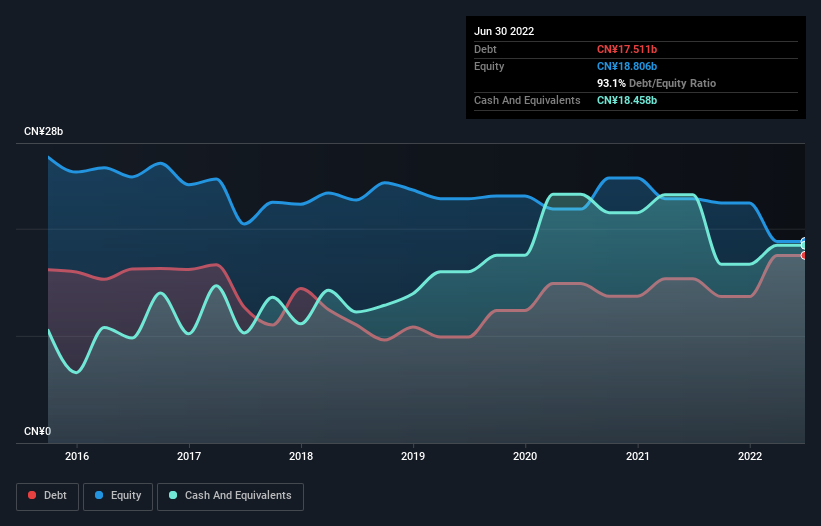Here's Why Tingyi (Cayman Islands) Holding (HKG:322) Can Manage Its Debt Responsibly

Some say volatility, rather than debt, is the best way to think about risk as an investor, but Warren Buffett famously said that 'Volatility is far from synonymous with risk.' When we think about how risky a company is, we always like to look at its use of debt, since debt overload can lead to ruin. Importantly, Tingyi (Cayman Islands) Holding Corp. (HKG:322) does carry debt. But the more important question is: how much risk is that debt creating?
When Is Debt A Problem?
Debt is a tool to help businesses grow, but if a business is incapable of paying off its lenders, then it exists at their mercy. In the worst case scenario, a company can go bankrupt if it cannot pay its creditors. However, a more common (but still painful) scenario is that it has to raise new equity capital at a low price, thus permanently diluting shareholders. Of course, debt can be an important tool in businesses, particularly capital heavy businesses. The first thing to do when considering how much debt a business uses is to look at its cash and debt together.
Check out our latest analysis for Tingyi (Cayman Islands) Holding
What Is Tingyi (Cayman Islands) Holding's Debt?
The image below, which you can click on for greater detail, shows that at June 2022 Tingyi (Cayman Islands) Holding had debt of CN¥17.5b, up from CN¥15.3b in one year. But on the other hand it also has CN¥18.5b in cash, leading to a CN¥947.7m net cash position.

How Healthy Is Tingyi (Cayman Islands) Holding's Balance Sheet?
According to the last reported balance sheet, Tingyi (Cayman Islands) Holding had liabilities of CN¥35.8b due within 12 months, and liabilities of CN¥9.17b due beyond 12 months. On the other hand, it had cash of CN¥18.5b and CN¥2.32b worth of receivables due within a year. So it has liabilities totalling CN¥24.1b more than its cash and near-term receivables, combined.
Tingyi (Cayman Islands) Holding has a market capitalization of CN¥71.2b, so it could very likely raise cash to ameliorate its balance sheet, if the need arose. However, it is still worthwhile taking a close look at its ability to pay off debt. Despite its noteworthy liabilities, Tingyi (Cayman Islands) Holding boasts net cash, so it's fair to say it does not have a heavy debt load!
The modesty of its debt load may become crucial for Tingyi (Cayman Islands) Holding if management cannot prevent a repeat of the 32% cut to EBIT over the last year. When a company sees its earnings tank, it can sometimes find its relationships with its lenders turn sour. There's no doubt that we learn most about debt from the balance sheet. But it is future earnings, more than anything, that will determine Tingyi (Cayman Islands) Holding's ability to maintain a healthy balance sheet going forward. So if you want to see what the professionals think, you might find this free report on analyst profit forecasts to be interesting.
But our final consideration is also important, because a company cannot pay debt with paper profits; it needs cold hard cash. Tingyi (Cayman Islands) Holding may have net cash on the balance sheet, but it is still interesting to look at how well the business converts its earnings before interest and tax (EBIT) to free cash flow, because that will influence both its need for, and its capacity to manage debt. Over the last three years, Tingyi (Cayman Islands) Holding recorded free cash flow worth a fulsome 92% of its EBIT, which is stronger than we'd usually expect. That positions it well to pay down debt if desirable to do so.
Summing Up
While Tingyi (Cayman Islands) Holding does have more liabilities than liquid assets, it also has net cash of CN¥947.7m. The cherry on top was that in converted 92% of that EBIT to free cash flow, bringing in CN¥545m. So we don't have any problem with Tingyi (Cayman Islands) Holding's use of debt. There's no doubt that we learn most about debt from the balance sheet. But ultimately, every company can contain risks that exist outside of the balance sheet. For example, we've discovered 1 warning sign for Tingyi (Cayman Islands) Holding that you should be aware of before investing here.
If you're interested in investing in businesses that can grow profits without the burden of debt, then check out this free list of growing businesses that have net cash on the balance sheet.
Valuation is complex, but we're here to simplify it.
Discover if Tingyi (Cayman Islands) Holding might be undervalued or overvalued with our detailed analysis, featuring fair value estimates, potential risks, dividends, insider trades, and its financial condition.
Access Free AnalysisHave feedback on this article? Concerned about the content? Get in touch with us directly. Alternatively, email editorial-team (at) simplywallst.com.
This article by Simply Wall St is general in nature. We provide commentary based on historical data and analyst forecasts only using an unbiased methodology and our articles are not intended to be financial advice. It does not constitute a recommendation to buy or sell any stock, and does not take account of your objectives, or your financial situation. We aim to bring you long-term focused analysis driven by fundamental data. Note that our analysis may not factor in the latest price-sensitive company announcements or qualitative material. Simply Wall St has no position in any stocks mentioned.
About SEHK:322
Tingyi (Cayman Islands) Holding
An investment holding company, manufactures and sells instant noodles, beverages, and instant food products in the People’s Republic of China.
Solid track record with adequate balance sheet.

